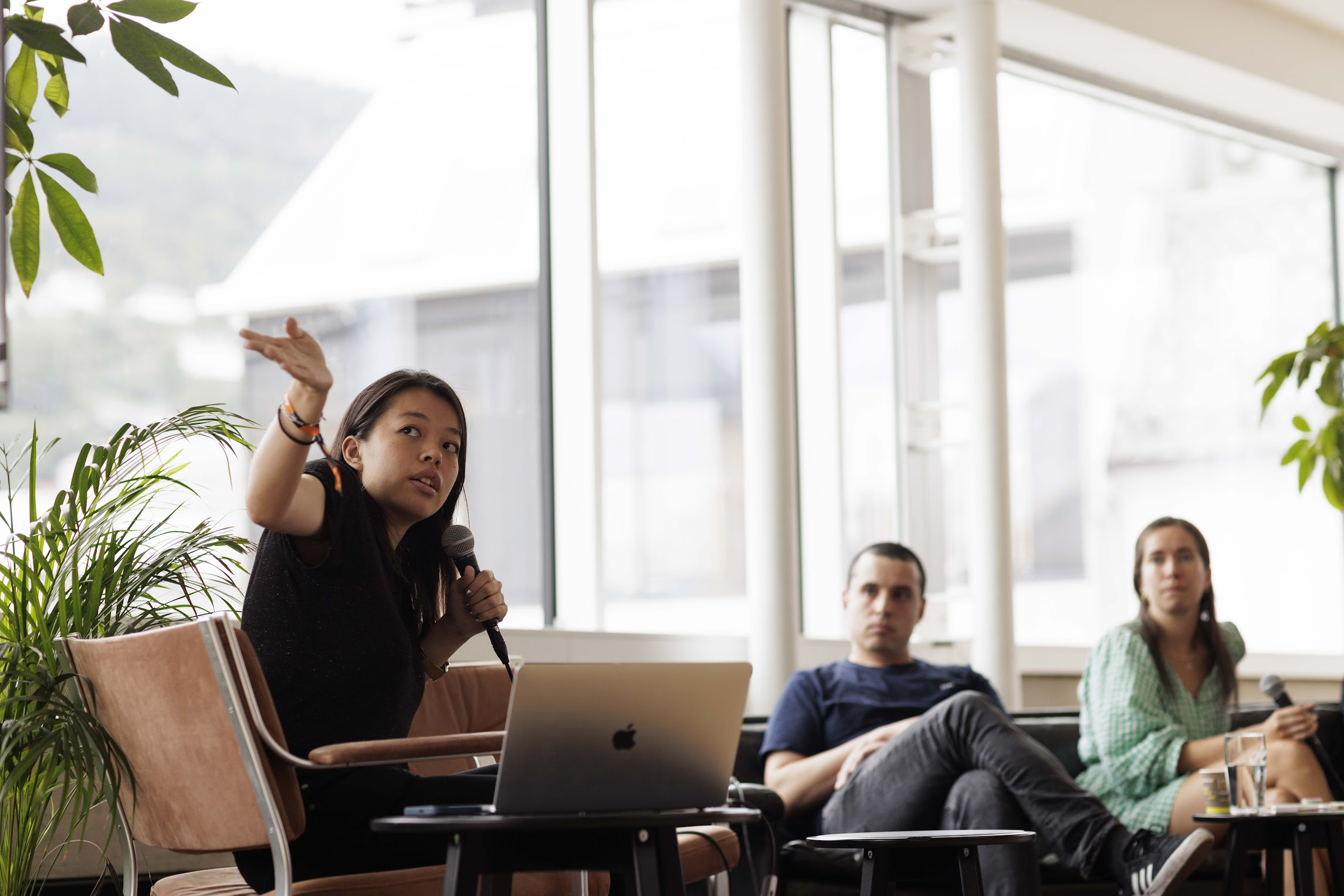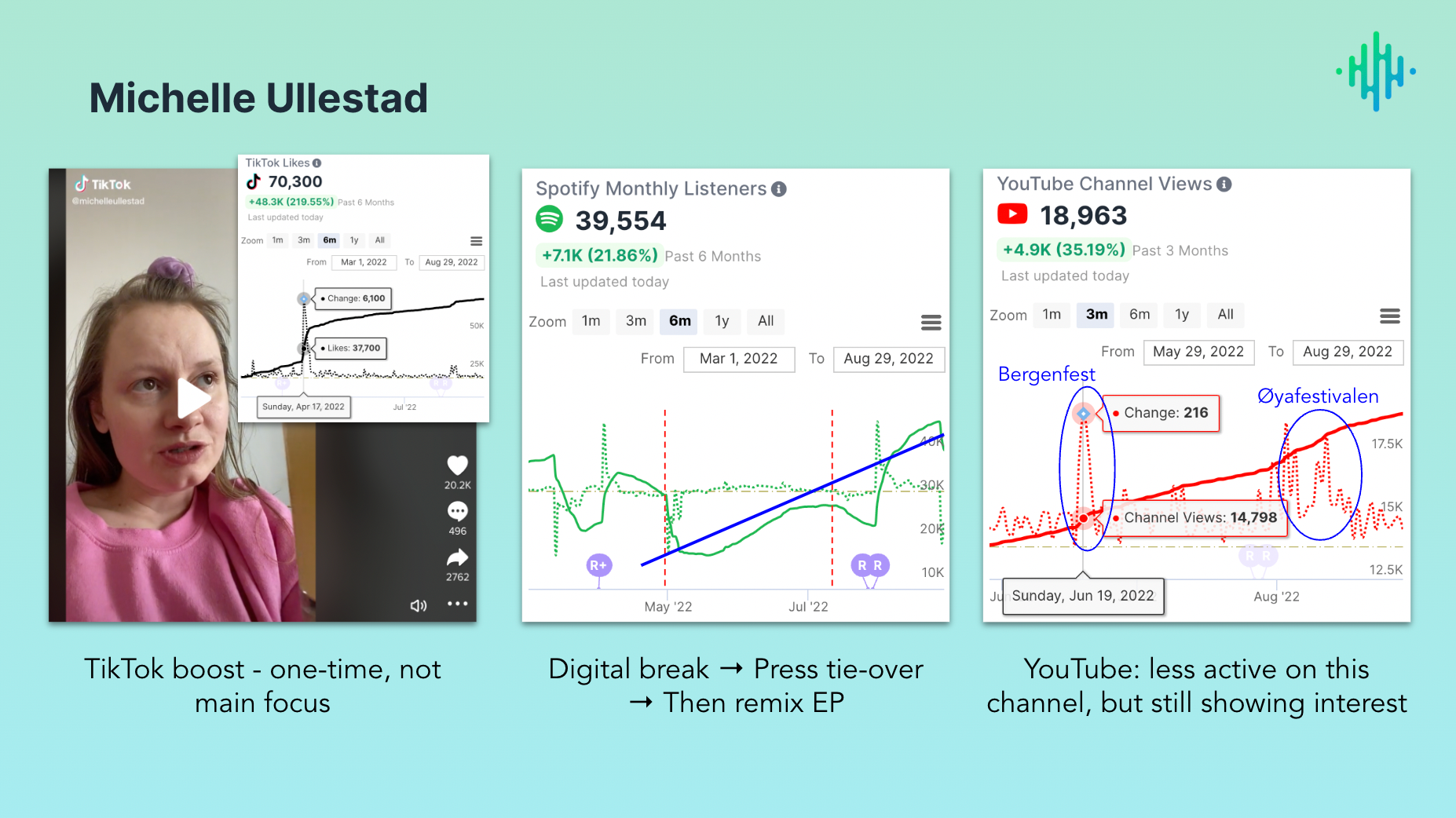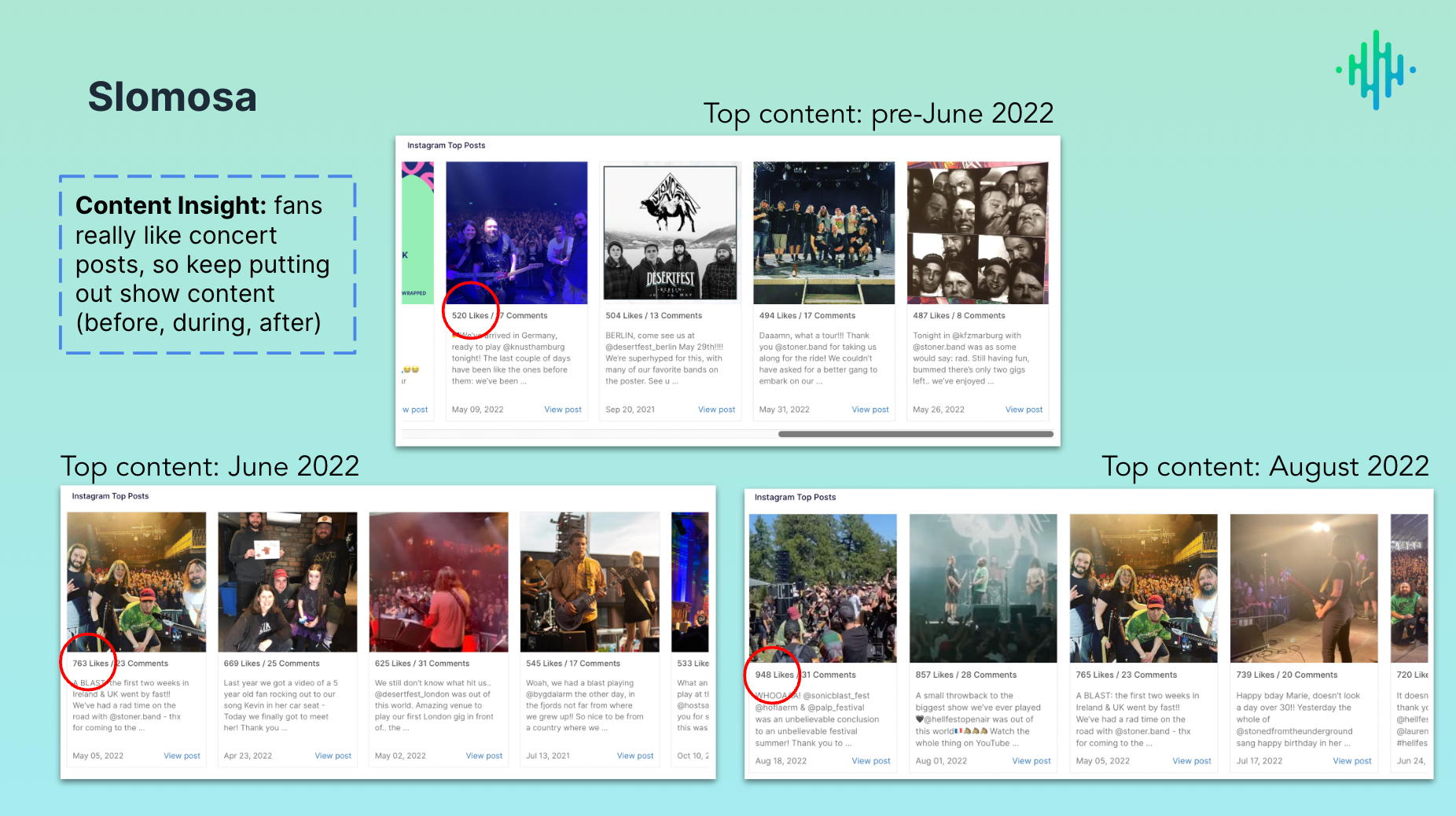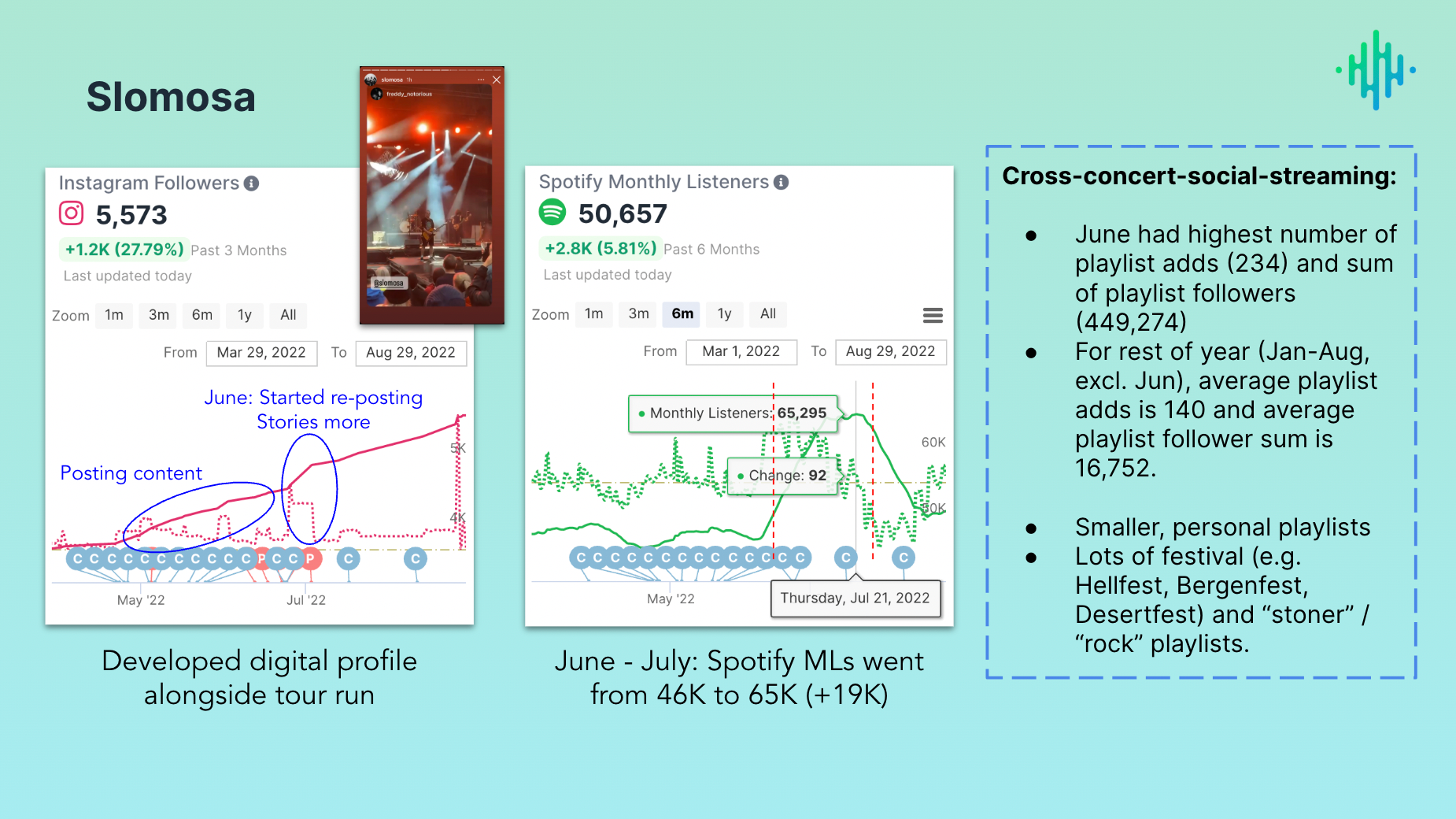Music Marketing Case Study: Developing 3 artists at Vill Vill Vest
Over the course of five months, Chartmetric, Brak, and Vill Vill Vest helped develop Norwegian artists Metteson, Michelle Ullestad, and Slomosa. Here are the insights you can apply to your own career.
by Michelle Yuen of Chartmetric
Norwegian music festival Vill Vill Vest serves both as a showcase for artists at some of the top venues in Bergen, Norway, and also as an insightful music business conference program for participants from all over the world. This year, Chartmetric, local music office Brak, and Vill Vill Vest worked on a consulting project with three artists and their managers to determine the best ways to understand their data and achieve their long-term goals.

Early on we decided that this project would run for a 5-month period beginning in April 2022, both to lead up to Vill Vill Vest in September and also to allow for enough time to extract insights and evaluate strategic effects. Three artists of varying genres and stages of development participated in this project: fashion-forward Norwegian Pop star Metteson, managed by Joar Nicolaysen; fast-rising Norwegian singer-songwriter Michelle Ullestad, managed by Mathilde Orlien; and the raw yet groovy Desert Rock band Slomosa, managed by their guitarist and singer Benjamin Berdous.

Metteson
For Metteson, manager Joar Nicolaysen’s long-term goal was easily stated: break internationally. It’s not uncommon to hear, but it’s something that definitely requires a lot of work to make a reality. When Joar and I first met in April, Metteson’s audience was predominantly Norwegian, with more than 40 percent of his Spotify Monthly Listeners coming from Oslo alone. However, they already had plans in place to bring his music to a wider audience, including supporting “Runaway”-hit singer AURORA on her UK tour in April and supporting fellow Norwegian singer-songwriter Sigrid in May. Metteson was also on track to perform more than 10 summer gigs and drop singles “Second Heart” and “Never Let Me Go.”
With so many events already in place, we focused on figuring out what actions he could take that would amplify existing plans. Looking back on his historical Spotify Monthly Listeners data, one of the improvements we determined we could make was audience retention. Instead of marketing releases for a week or two, sometimes looking months ahead can help an artist’s music continuously cut through the noise. Before April 2022, Metteson’s releases retained half of the audience he acquired each time, as listenership dropped off once the new releases were removed from playlists. In the following months that we worked together, developing his social media presence was key in establishing a more personal connection and retaining audiences beyond streaming.

Developing a social audience was also important for exposing him to people with similar tastes who could become new fans. Given Metteson’s support for AURORA and Sigrid’s shows, we discussed leaning into their audiences (majority female 18-24) to expand his current reach (majority female 25-34) through practical actions like tagging the artists on his Instagram and vice-versa.
Metteson’s release of the single “Second Heart” around the same time he supported AURORA’s shows also meant both his existing fans and potential new audiences had something to be excited about—new music. With post-AURORA support and “Second Heart” promotion, Metteson’s Instagram followers increased 76% percent from 4.3K+ to 7.5K+. His social media engagement also went up significantly during this period to an average of 35 comments per post in April and May with a very positive sentiment, a 59 percent increase compared to the rest of the year’s average of 22 comments per post.
Michelle Ullestad
For singer-songwriter Michelle Ullestad, who has rapidly been carving out her own space in the Norwegian music scene, manager Mathilde Orlien had a more targeted long-term goal: make Ullestad a top artist in the Scandinavian market. Ullestad was very aware that she chose to write and sing in Norwegian and therefore wanted to focus her efforts more locally than globally. As relatively new artist, Ullestad had already gained some solid national recognition via radio and press early on in 2022 and had also been booked for a decent number of gigs throughout the summer. When Orlien and I caught up in April, Ullestad had already released her second EP “SOL” and was looking ahead to her shows.
Since she was still in a stage of growth, we discussed following up on Michelle’s social media and digital profiles in order to build a full picture of her image as an artist. Given her local focus, it still made a lot of sense for her to focus on more traditional avenues like radio, press, sync, and TV opportunities, but we wanted to try and connect this as much as possible to her digital presence. When potential fans hear about an artist in real life, the easiest way for them to remember the artist once they’re no longer right in front of their faces is to connect with the artist online. And the easier it is to search for the artist and get the right result immediately, the more likely potential fans are to hit the follow button to get updates on the artist later. Consequently, it’s important to enter the correct information and maintain updated profiles on all relevant digital platforms.

Right after our first catch up, Ullestad almost instantly began seeing a sudden boost on her TikTok, thanks in part to a funny video of hers that started gaining traction. To date, this clip has 303.4K views and 20.2K likes, which more than 25 percent of the total number of likes across all her videos. Since this was something that happened spontaneously, we decided not to make this a main focus and concentrated on developing her digital profile more broadly.
From May to July, Ullestad took a step away from social media to focus on herself. This was unexpected, as we had made plans to establish her online presence more clearly; however, it was far more important to put her mental health first. After all, artists are people, not machines.
Spending time off the grid didn’t mean that Ullestad disappeared entirely. In fact, Orlien secured some great national and local press, landing Ullestad a recorded TV appearance and potential TV sync as well. This is what it means to strategize with the long term in mind, because fans had alternative ways to connect with Michelle while she was offline. By the time Ullestad returned with her remix EP “SOLFORMØRKELSE” at the end of July, she saw one of her highest increases (110 percent) in Spotify Monthly Listeners for the year, going from 22K+ to 46K+.
As she embarked on her summer festival run, we discovered another interesting insight in the data. Despite being less active on YouTube, Ullestad’s YouTube Channel Views showed significant spikes whenever she performed at large festivals like Bergenfest and Øyafestivalen. It seemed that fans were seeing her live at these shows and actually following up and looking for her online, lending more credence to the insight that an artist’s profile should be connected across both digital and physical platforms.
“Being able to analyze data for a specific artist project over a longer time period together with Chartmetric, and by using their platform as analysis tool, was extremely insightful to see how events (release of music, concert, press coverage, social media post) was received by listeners/fans and how the engagement was increasing/decreasing, and use the information towards how to react to the data. I would say that it’s all about having the access to the data, but also prioritize as a label or management team to spend some time during your week on analyzing the data, because it can give insightful information for the benefit of pushing your project further. You can either work in line with the data, because the response/engagement is in line with your strategy or you can work towards it. It can be a tool of seeing if a strategy is working or getting the response you predict, or a way to get insight or new knowledge of new ways to go along with a project that you hadn’t predicted without seeing the data.” – Mathilde Orlien, Michelle Ullestad’s Manager
Slomosa
For Slomosa, the cool desert Stoner Rock band coming straight from the ironically cold and wet climate of Bergen, the focus was on a post-COVID return to normal. Considering Slomosa’s last release was in August 2020, it wasn’t a big surprise when I met with guitarist, singer, and manager Benjamin Berdous that their main aim was to gauge the current interest of their fans. For a band that hadn’t released any music recently and couldn’t perform live due to the pandemic, Slomosa still retained an impressive 66 percent of their Spotify Monthly Listeners well into April 2022. They were also booked for a whopping total of 52 shows and festivals throughout the summer. While Berdous and I threw around several ideas, including asking their distributor for radio and playlisting support, we ultimately kept it simple: Keep building the band’s profile online and offline, strengthening personal relationships with fans, and working toward the next release.

From the beginning, it was clear that we needed to figure out how Slomosa could connect with fans through social media in a way that wasn’t disruptive to the band’s touring schedule. Going through their Instagram Top Posts, we noticed that most were pictures from concerts they’d played. This was content that they were going to create on tour anyway, so we decided to lean into this and do more show posts. From June to August, they quickly racked up likes on the platform. In fact, their top post now has almost 1000 likes, more than double their average likes per post.

As Berdous developed Slomosa’s Instagram profile alongside their tour run, we also began seeing a steady increase in followers. In June, he started re-posting fans’ stories on the band’s account, generating another uptick in their fanbase. As their digital footprint grew and the band continued to play shows across Europe, it seemed that their work online and offline was starting to cross platforms and pay off in the form of listeners and playlisting on Spotify. It’s difficult to say for sure because we don’t have every single data point to form a complete map of the exact journey of fan interest from one medium to another, but from June to July, Slomosa saw their Spotify Monthly Listeners jump from 46K+ to 65K+, a significant 42 percent increase in the space of just two months.
When we ran some numbers to figure out where these listeners were coming from, we found that they had 234 playlist adds in June, adding up to 449,274 playlist followers total, which was about 1.7x their average playlist adds and 26.8x more playlist followers than usual. Some playlists added multiple tracks, so there was likely some double or triple counting in the calculated playlist reach, but it was still a very impressive run that generated a significant amount of listenership post-touring. Another interesting finding was that most of the playlists that Slomosa was added to during this period were all smaller, user-generated playlists. Many of these were personal lists that people created for festivals that the band was performing at or lists that had the words “stoner,” “desert,” and “rock” in the playlist name, clearly demonstrating sustained audience interest in their genre of music.
“The world of stats and social media can be confusing. Working with Michelle I learnt a lot about reading the numbers and how to interpret them. In return we got a bigger presence on our socials, making it possible for us to reach more people with our content. Like it or not, your socials are an important part of being an artist, as it’s the easiest way to communicate with fans and promote your music. For someone like me, who at the outset found it tiring to keep up with the online activity, I now have a way of doing those things without spending too much time or effort with it. Following our growth through this year’s 80 gigs has been exciting, and it’s nice to see that we’ve managed to transfer it to our socials as well.” – Benjamin Berdous, Slomosa’s Manager, Singer, and Guitarist
Know Your Data, Know Your Artist, Know Their Audience
Managing and developing an artist is no easy task, especially given today’s constant competition for eyeballs and ears across all the different platforms out there. Not only do artist managers need to be sharp, wear multiple hats, and be passionate about their artist, they also have to craft effective strategies and take advantage of any worthwhile opportunity that arises. Understanding as much as possible about an artist and an artist’s audience is key for pitching, planning, booking, negotiating, and developing a sustainable artist career.
“Following the project from the sidelines, I saw the spider web of opportunities coming from concerts, interviews, and social media posts. It’s all about having access to the data and the artists putting their analyst hat on.” – Kristian Stockhaus, Brak
Every manager we worked with did a fantastic job showcasing how actionable insights can be drawn from data and applied to any artist, regardless of genre or development stage. As long as we work to understand how to best incorporate data into the bigger picture, we can always figure out how to make the numbers work for us in a way that complements the art. If data can motivate a Stoner Rock band to become more efficient and effective with social media so they don’t have to spend as much time on it, then what can’t it do?
I agree with a lot of this. Get to know your audience, experiment with different sounds and beats, look at other hit songs to see what people like about that, and keep a general theme going! With that, you just might be able to get somewhere.